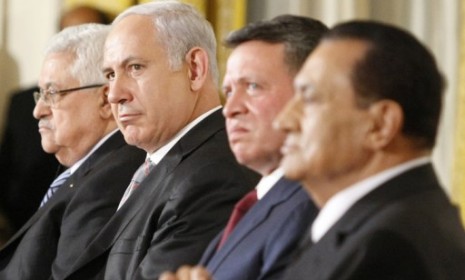What the Egypt protests mean for Mideast peace
Israelis are worried that neighboring Egypt could become a new Iran. But what does the uprising mean for Israel's negotiations with the Palestinians?

A free daily email with the biggest news stories of the day – and the best features from TheWeek.com
You are now subscribed
Your newsletter sign-up was successful
Reverberations from Egypt's pro-democracy uprising are being felt across the Middle East — and perhaps nowhere more acutely than in Israel. The expected departure of Egyptian President Hosni Mubarak would deprive Israel of one of its most stable allies in the region, and a new government might not uphold the 1979 Israeli-Egyptian peace treaty. Or worse, as Israeli Prime Minister Benjamin Netanyahu warned, Egypt could turn into a new Iran. Will these fears prompt Israel to return to the negotiating table with its even-closer neighbors in Gaza and the West Bank?
Israel has to step it up: If Egypt's uprising has taught us anything, it's that Israel is on its own, says Smadar Perry in The Jerusalem Post. The next Egyptian leader won't be as helpful regarding the Palestinians, and the Obama team's tepid "anti-Mubarak agenda" proves it doesn't understand "the code of tradition in our part of the world." Israel has to drop its "delusional" avoidance of making peace with our Palestinian neighbors. "No one will do the job for us."
The Week
Escape your echo chamber. Get the facts behind the news, plus analysis from multiple perspectives.

Sign up for The Week's Free Newsletters
From our morning news briefing to a weekly Good News Newsletter, get the best of The Week delivered directly to your inbox.
From our morning news briefing to a weekly Good News Newsletter, get the best of The Week delivered directly to your inbox.
The peace process is on ice: The "understandably twitchy" Netanyahu government won't embrace the peace process now, says "Clausewitz" in The Economist. "The turmoil in Egypt is only entrenching" Israelis in their current positions, and Netanyahu believes there's no point in cutting a deal with Palestinian President Mahmoud Abbas, since he may not be able to make it stick. Besides, with Iran's nukes and Hezbollah's "bloodless coup" in Lebanon, Israel has bigger worries.
"Feeling understandably twitchy"
Israel has a shot at a bigger peace: Israel isn't the only nervous Mideast government, says Aluf Benn in Foreign Affairs. And if Israelies can overcome Netanyahu's "siege mentality," Egypt's woes could provide an opportunity not just to forge new, mutually beneficial peace deals with Abbas and the equally nervous leader of Syria, but also to "take part in the rebuilding of the Middle Eastern community" by "proposing a serious blueprint" for region-wide peace.
"Overcoming fear and anxiety in Tel Aviv"
A free daily email with the biggest news stories of the day – and the best features from TheWeek.com
-
 ‘Those rights don’t exist to protect criminals’
‘Those rights don’t exist to protect criminals’Instant Opinion Opinion, comment and editorials of the day
-
 Key Bangladesh election returns old guard to power
Key Bangladesh election returns old guard to powerSpeed Read The Bangladesh Nationalist Party claimed a decisive victory
-
 Judge blocks Hegseth from punishing Kelly over video
Judge blocks Hegseth from punishing Kelly over videoSpeed Read Defense Secretary Pete Hegseth pushed for the senator to be demoted over a video in which he reminds military officials they should refuse illegal orders
-
 The billionaires’ wealth tax: a catastrophe for California?
The billionaires’ wealth tax: a catastrophe for California?Talking Point Peter Thiel and Larry Page preparing to change state residency
-
 Bari Weiss’ ‘60 Minutes’ scandal is about more than one report
Bari Weiss’ ‘60 Minutes’ scandal is about more than one reportIN THE SPOTLIGHT By blocking an approved segment on a controversial prison holding US deportees in El Salvador, the editor-in-chief of CBS News has become the main story
-
 Has Zohran Mamdani shown the Democrats how to win again?
Has Zohran Mamdani shown the Democrats how to win again?Today’s Big Question New York City mayoral election touted as victory for left-wing populists but moderate centrist wins elsewhere present more complex path for Democratic Party
-
 Millions turn out for anti-Trump ‘No Kings’ rallies
Millions turn out for anti-Trump ‘No Kings’ ralliesSpeed Read An estimated 7 million people participated, 2 million more than at the first ‘No Kings’ protest in June
-
 Ghislaine Maxwell: angling for a Trump pardon
Ghislaine Maxwell: angling for a Trump pardonTalking Point Convicted sex trafficker's testimony could shed new light on president's links to Jeffrey Epstein
-
 The last words and final moments of 40 presidents
The last words and final moments of 40 presidentsThe Explainer Some are eloquent quotes worthy of the holders of the highest office in the nation, and others... aren't
-
 The JFK files: the truth at last?
The JFK files: the truth at last?In The Spotlight More than 64,000 previously classified documents relating the 1963 assassination of John F. Kennedy have been released by the Trump administration
-
 'Seriously, not literally': how should the world take Donald Trump?
'Seriously, not literally': how should the world take Donald Trump?Today's big question White House rhetoric and reality look likely to become increasingly blurred